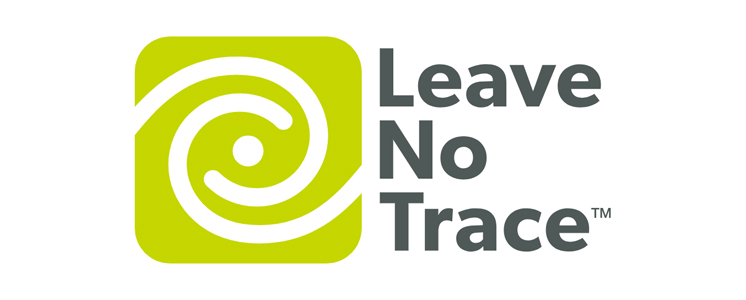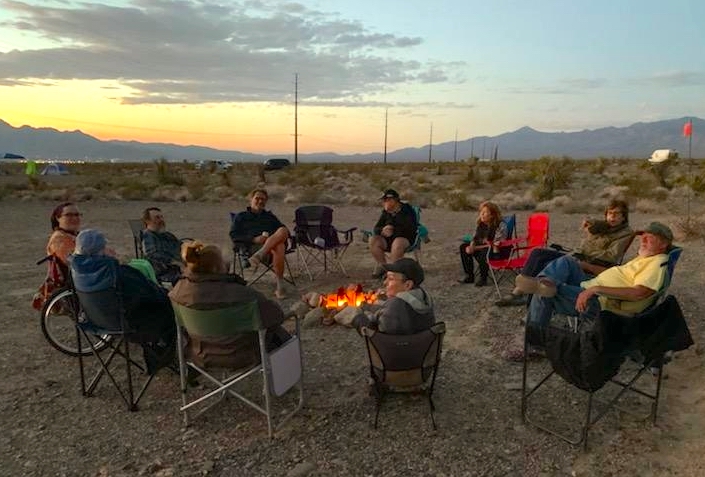
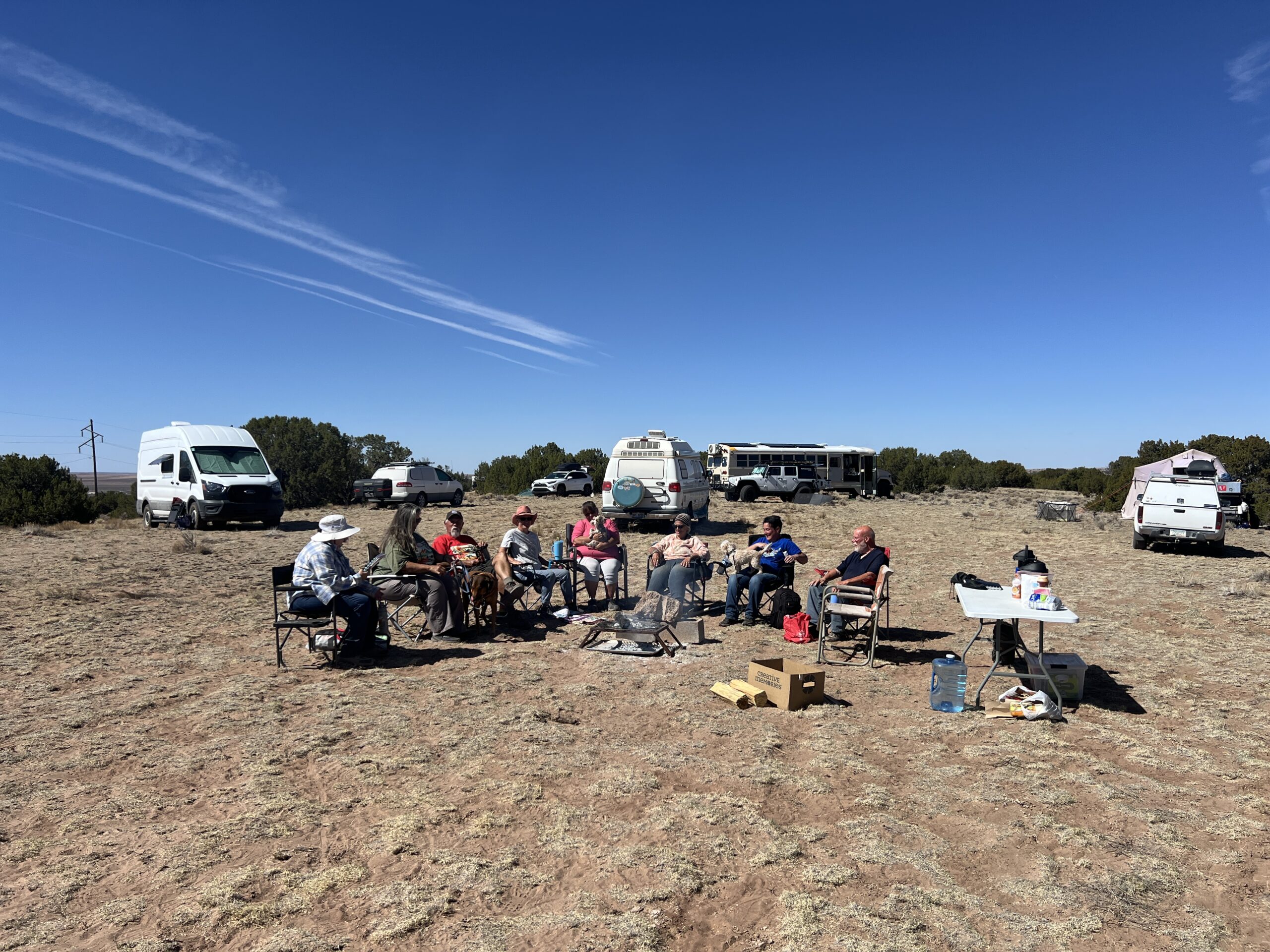
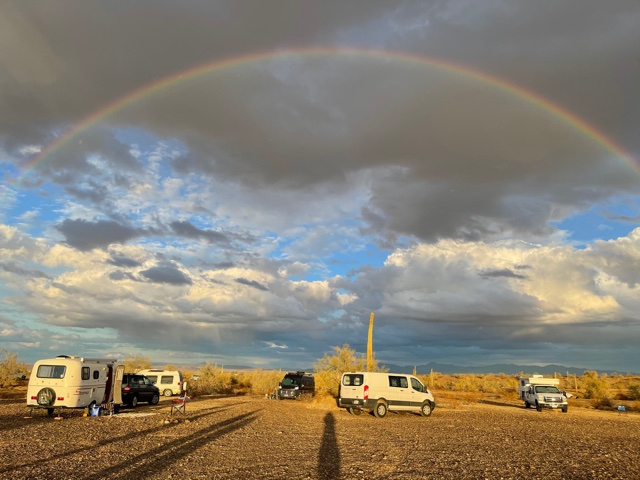
Join Us – You don’t have to be alone …
On an impromptu basis, HOWA will suggest a location to camp casually with other nomads. The camp location will typically be on lands managed by the BLM. The location is chosen at the last minute to ensure its availability. A camp location is selected for its proximity to nearby towns for supplies, services, cell connectivity, and accessibility by all types and sizes of rigs.
At HOWA, we’re not just an organization; we’re a vibrant community dedicated to enhancing the lives of nomads. As a 501(c)3 charitable organization, our mission is clear and impactful — we’re here to help nomads make their mobile lifestyle functional and provide a supportive community.
As ardent supporters of the Leave No Trace program to save and protect our national forests, parks, and all outdoor environments, we subscribe to and promote their seven principles:
- Plan Ahead & Prepare
- Travel & Camp on Durable Surfaces
- Dispose of Waste Properly
- Leave What You Find
- Minimize Campfire Impacts
- Be Considerate of Other Visitors
- Respect Wildlife
Next In Person Caravan Dates: November 10th – November 21st
Location Area: Lake Havasu City, AZ (Actual location will be announced on the evening of Nov. 9th)
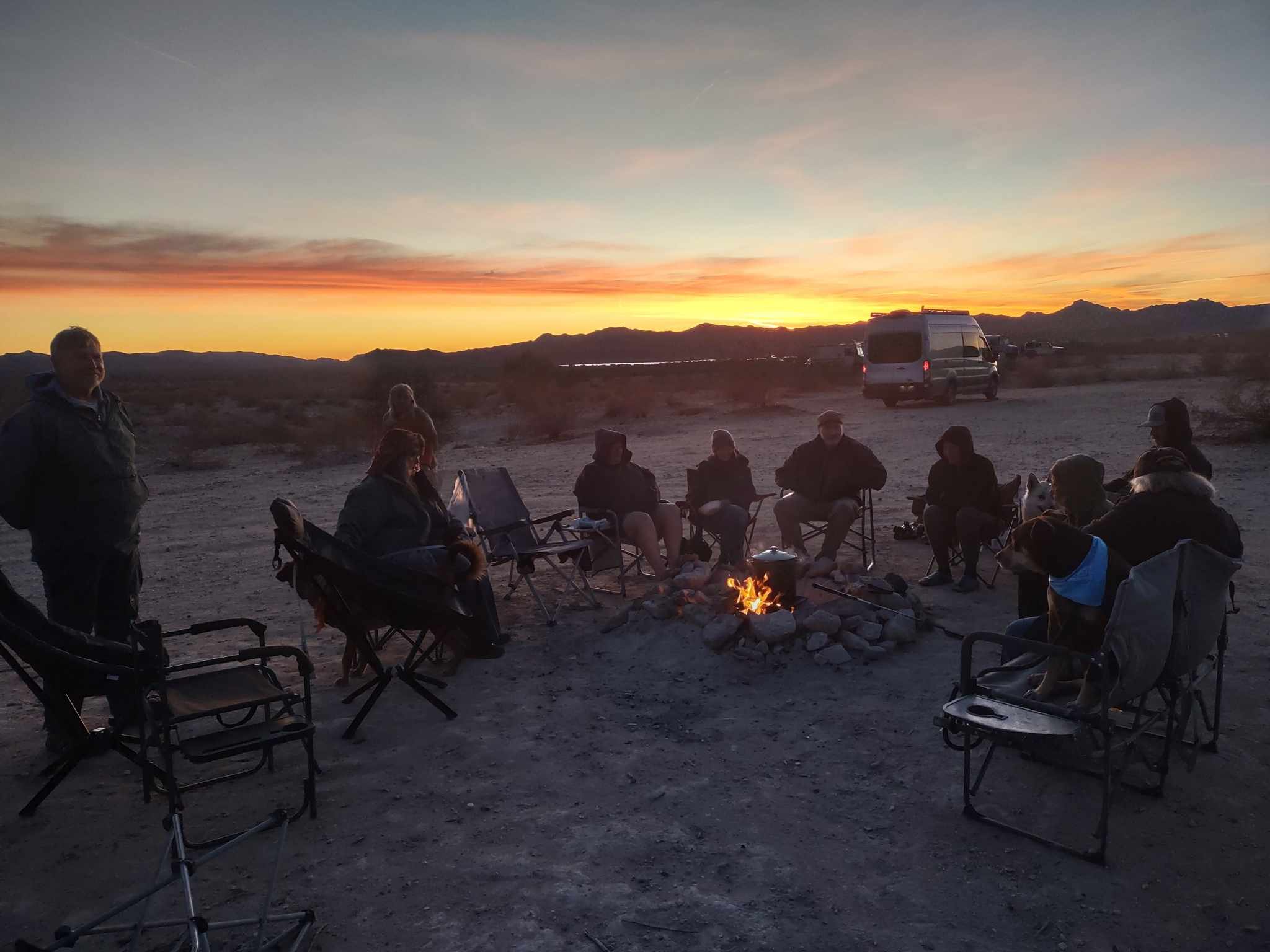
Caravan Camp FAQs
What is a HOWA Caravan?
These camps are for people who want to join friends from the mobile community. HOWA announces a specific location for participants to come together for unorganized, casual camping. Camps range from 5 to 75 people, depending on the number who show up and how many vehicles the camping location will accommodate. Campers are free to stay to themselves or join in, as they desire.
Camp locations accommodate many types of rigs – cars, vans, RVs, and more.
Campers stay at a dispersed camping location no more than 14 days. Many nomad friendships evolve while camping together. After their 14 days is over, folks are encouraged to ‘spin off’ into their own personal groups. They move to a new location of their own choice. Campers take this opportunity to develop more skills at finding dispersed camping locations and developing a larger network of nomad friends.
Dispersed camping on public lands is free — casual camping with no amenities. No registration is needed.
How do I sign up to Join a Caravan?
- It’s FREE — HOWA’s impromptu camp location service is offered to you at no cost.
- No sign-up is required.
- The specific location is published on the day the caravan begins. After reading the Liability Release, click AGREE to the Liability Release to see the Caravan location.
How do I find the Caravan Location?
To make it as easy as possible for participants to find a Caravan location:
- Written directions to the Caravan Camp will be posted to this page when the Caravan begins, along with
- GPS coordinates* to center camp (Click here for Bob Wells’ CheapRVLiving video to learn about GPS Coordinates.)
*Recommendation: Once off pavement, do not follow Google Maps’ directions (or any other mapping program’s directions) to the GPS coordinates of center camp. The mapping programs will take you the shortest distance. On dirt and gravel roads, the shortest distance is not always the safest route. Look at satellite views for a better idea of the safest route. Read the written directions provided for a safer route. Many have got stuck in sand, or unable to turn around, when blindly following the mapping program’s directions to GPS coordinates in the back country. Click here for Bob Wells’ CheapRVLiving video to learn about GPS Coordinates. Keep yourself safe!
What do I do when I arrive at Caravan Camp?
When you arrive:
- You may see a person at the center camp location waiting to welcome you. If so, stop to introduce yourself!
- If there are other nomads at the location, give a wave, smile, or quick hello to your campmates who are out and about, then
- Locate a place for your personal camp (read below for recommendations for selecting a personal camp), then
- Set up your personal camp, then,
- If people gather together, join any evening and morning gathering around a campfire, as you desire. This is the primary place where participants congregate in order to get to know one another. This is where community begins.
Recommendations for Selecting Your Personal Camp
Recommendations to select your personal camp within the larger camping group:
- Arrive with plenty of sunlight to spare. It’s not fun finding or setting up camp in the dark.
- Find a personal camp location that is the desired distance*:
- From center camp, and
- From other participants’ personal camps.
- Note: Keep the personal campsites closest to center camp for those with mobile disabilities, and
- Select a safe place to put your personal camp. Important note:
- In the desert, avoid camping in washes (dry creek beds).
- Even though you’ll see more shade in the washes, they may become dangerous torrents of water when raining in the surrounding mountains.
- If you select a location that is close to others’ personal camps:
- Ask if your distance is too close (especially if lots of other places are available for you to park).
- If too close, select another location for your personal camp.
- If you expect to do anything that may intrude on others’ experiences of being in nature, examples — burn outside lights all night long, create noise (late campfire discussions, run a generator, play music, have loud pets, etc.), make odors (engines, cigarettes, etc.) — talk with your potential neighbors to make sure they are OK with that.
- Suggestion: Be as specific as possible when talking with your potential neighbors. For example, if you run a generator just a few minutes in the morning and evening to power a microwave, that may be ok with them; whereas, if you run a generator all night long to keep your swamp cooler going, they may ask you to move elsewhere.
- As a courtesy, if someone new stops near by, let them know before they set up their personal camp. They may want to move elsewhere.
- In the desert, sound carries very clearly for a very long distance (miles).
- Neighbors differing convictions and actions about disease precautions may be another reason you may want to move your camp elsewhere. See below for HOWA’s recommendations for being the kind, caring, supportive community that we are … even among those whose convictions and actions oppose our own.
*Some people like to be close in, and others far away from the center camp (a half mile or more). There’s not a single right way to select your personal camp location. In fact, you can move your personal camp every day if you want to!
How does HOWA select a location?
- The camp locations meet the following criteria:
- In compliance with the policies of that public land (number of campers, length of stay and distance from last stay),
- Sufficient room for 35, or sometimes less rigs to comfortably camp together without doing damage to the land or plant life,
- The locations meet as many of the following criteria as possible:
- Internet service by at least one major carrier,
- Within an hour’s drive of town for supplies,
- Mostly comfortable weather, based on historical data,
- Dispersed camping on public lands is free. Registration with BLM is typically not required (except in the busy season in Quartzsite, AZ).
How should I prepare?
Nothing will be provided at the camp location.
To avoid onerous and costly permitting processes, these camps are casual camping only. HOWA is not providing any organization or amenities.
- Campers are encouraged welcome one another.
- Campers typically learn lots from each other about the nomadic lifestyle.
- Informal discussions at impromtu campfires are the best for learning from each other.
- Campers usually find lots to do together. There are not any pre-organized outings.
- Each camper responsibly stores and disposes of their own human waste. There are no bathroom or disposal facilities at these casual camp locations.
- Each camper arrives prepared with enough water and water storage containers for themselves (typically an average of one gallon per day).
- Each camper maintains a clean neat camp, leaving the area better than they found it. For more information, check out LeaveNoTrace, as well as the information at TreadLightly. Pack it in, pack it out. There will be no trash bins or dumpsters at the location. There is no one to pick up after you. Leave the area cleaner than when you arrived.
- Each camper arrives with enough funds to live and drive for their entire time at camp. In addition, each participant has a savings in case of an emergency*. Be self-sufficient. Your campmates will not support you financially.
- Each camper arrives prepared to be 100% self-sufficient at the camp.
Recommendations for Safety and Comfort
Recommendations for participants’ comfort and safety in a winter desert environment where dryness, wind, heat, cold, prickly things, rocks, and coyotes are the norm:
- Drink lots of water to avoid dehydration, especially when the wind is sapping moisture from your body.
- Wear thick-soled shoes with good support to manage the rocky, uneven ground.
- Wear a wide brimmed hat and sunscreen.
- Keep smaller animals close to prevent them from becoming prey.
- Dress in layers and sleep with layers of blankets to manage temperature variations.
- When cold, avoid wearing cotton or cotton blends. (https://www.adk.org/why-we-say-cotton-kills/)
- When hot, wear cotton moistened with water.
- Avoid camping in washes (dry creeks/riverbeds) where there’s more shade. When it rains in the nearby mountains, water may flow, sometimes in a torrent.
What should I do in case of Emergency?
In case of an emergency, call local Law Enforcement or Emergency Services:
- Be prepared to give verbal directions to your camp. (In the past, GPS coordinates have not been useful for first responders.) Use the names of paved roads, mile markers, distances, or send someone to guide them in from the main highway, if necessary. The written directions provided on this webpage may assist you.
- Recommendation: It is good practice to put emergency information in an envelope labeled “ICE” (in case of emergency) in plain sight in your rig. Inside the envelope list your emergency contacts, medical conditions, medications, and advanced directives (end-of-life medical care, or not). Include information for your pet’s care.
- Recommendation: Make sure you have the correct number to call for Law Enforcement and Emergency Services. Usually this is “911.” But, if you are close to a state border, then your 911 call may go to the wrong state’s Emergency Center because the cell tower your call used is in the neighboring state. Therefore, if close to the border, find the correct dispatch number to call for emergencies for the actual state and county in which you are camped.
- Recommendation: Before you get to the next camp, write down the verbal directions and emergency number. Keep them handy if needed if you must call emergency services.
Sexual Harassment
Sexual harassment includes any unwanted verbal or physical sexual behavior. This can range from sexual comments about a person’s clothing, anatomy, or looks, to very serious acts that qualify as assault or rape. Sexual harassment is about the impact of the behavior on you [the victim], and the severity and frequency of the incidents. It is not about the intent of the person who is engaging in the behavior. (https://www.mycallisto.org/cresources/language)
Not tolerated.
No means no.
Report to local law enforcement (see above “Emergency” question).
Sexual Harassment from the US Equal Employment Opportunity Commission:
“It is unlawful to harass a person … because of that person’s sex. Harassment can include “sexual harassment” or unwelcome sexual advances, requests for sexual favors, and other verbal or physical harassment of a sexual nature.
Harassment does not have to be of a sexual nature, however, and can include offensive remarks about a person’s sex. For example, it is illegal to harass a woman by making offensive comments about women in general.
Both victim and the harasser can be either a woman or a man, and the victim and harasser can be the same sex…” https://www.eeoc.gov/sexual-harassment
Recommendations to Create Community
Nomads camp together to find a community in which they feel a sense of belonging. Many of us are introverts and, so, it may take some initial effort for us to connect with others.
When you join a new camp, it’s sometimes intimidating to be around so many new people. This is a time to take baby steps to expand our comfort zone. One suggestion: First, simply give a friendly nod to people on a daily walk or a visit to the campfire, then wave to them the next day on a walk. The following day, say something like “nice rig” as a conversation starter. By then, I suspect, at least one connection will happen. Take it slow, and you will find your community.
As nomads, we have so many unique attributes that make us like-minded, such as our —
- love for nature,
- best places to camp on public land,
- love for the road,
- small space living,
- vehicles made into homes,
- minimalism,
- outdoor cooking,
- night sky viewing,
- hiking,
- hobbies,
- etc.
Focus on these attributes and everything else that makes us like-minded nomads; and also recognize and honor the differences as we get to know one another.
To avoid conflict at the camp, please do not bring up or wear items that highlight controversial topics or imply devaluing of others related to:
- politics,
- religion,
- race,
- gender identity,
- sexual orientation, or
- any other “hot-button” topic.
Homes On Wheels Alliance is committed to cultivating and preserving a culture of inclusion and connectedness. The collective sum of our individual differences, life experiences, knowledge, innovation, self-expression, and talent represents not only part of our culture, but our reputation as well. When we camp together, we welcome the unique contributions that participants can bring in terms of their education, opinions, culture, ethnicity, race, sex, gender identity and expression, nation of origin, age, languages spoken, veteran’s status, color, religion, disability, sexual orientation and belief.
Creating Spin Off Camping Groups
Spin-Off Groups are Good:
What usually happens, is that people make friends, gain confidence and then go off to travel together in smaller spin-off groups. On the other hand, many will decide to stay with the larger group until the end of the season. Going back and forth is good too.
HOWA considers these spin-off groups successes!
Some examples of reasons to create a spin off group:
- To keep each camps under 75 people,
- To see a specific sight or have a specific experience elsewhere,
- To camp with others who keep the same wake-sleep hours,
- To camp with those who run generators, or don’t run generators,
- To be with others who share the same level of COVID risk-aversion,
- To camp without smoke from a campfire, cigarettes, wildfires, etc.
- To be with a smaller number of campers,
- To camp with others who share the same, or different, philosophies,
- To enjoy the same type of music — listening, singing, or playing on instruments,
- To camp with others who enjoy partying,
- To find a place that is prettier, has better hiking, close-by tourist attractions, etc.
- To find better weather, cell service, town amenities, etc.
- Any reason is a good reason.
Where can I camp in Quartzsite, AZ?
FREE CAMPING on Bureau of Land Management (BLM) land. The BLM has designated five free 14-day Camping Areas surrounding Quartzsite. This is raw desert land with dirt roads without any amenities (e.g., no bathrooms, water, trash, etc.). Arrive prepared to be self-sufficient and to leave no trace. The camp areas are listed from north to south, east to west (see attached map).
1 – PLOMOSA ROAD – north of I-10 and just east of Hwy 95. https://maps.app.goo.gl/C9XK6Fw5HjuDbQLR6.
2 – HI JOLLY – north of I-10 and just east of Hwy 95, near Mile Post 12. Smallest of all BLM camping areas. https://maps.app.goo.gl/EwHnSNnqK3H9ohdQ7.
3 – SCADDEN WASH – just south of I-10, off of Kuehn Rd east of Hwy 95 off Kuehn Rd. Largest of all camping areas. https://maps.app.goo.gl/t5dmXS3btYRgc1cF6. This camping area goes east and then south at least another 5 miles, with a lot of camping spots along the way.
4 – DOME ROCK MOUNTAIN – just south of I-10, west of Hwy 95 off Dome Rock Rd. https://maps.app.goo.gl/q5QdMMDEW5kmA6xU8.
5 – ROAD RUNNER – west of Hwy 95 at 53rd St (aka La Paz Valley Rd) just past milepost 99. https://maps.app.goo.gl/Sha5MRGmUzYYSoHg9.
MORE INFO about the rules for 14-day camping and other camping options under “Camping & Picnic” section at https://www.blm.gov/…/rec…/recreation-activities/arizona.
LA POSA LONG-TERM VISITOR AREA (LTVA) – For a fee, the LTVA provides 11,400 acres of camping on raw desert land with some amenities — 10 ADA accessible vault toilets, 8 water faucets, dry dump station, dump station with water, trash services, dance floor and ramada. Currently the La Posa LTVA fees are $180 for 7 months or $40 for 14 days. A map and details about the costs, rules and benefits are at https://www.blm.gov/visit/la-posa-long-term-visitor-area.
ARIZONA STATE TRUST LAND offers limited time and low-cost access to camping on raw desert land with no amenities. Individual permits are $15 per year, with overnight camping limited to 14 days. For more information and to purchase a permit, go to https://land.az.gov/faqs…. The closest State Trust Land in Quartzsite is located north of I-10, off N Central Blvd (Hwy 95), near Tyson St. It’s the smallest of all camping areas. Here is a link to a map that shows the land — https://gis.azland.gov/webapps/parcel/?loc=-114.2203,33.6870,15&layers=3,2,0.
Pets
Many people have pets when camping on public lands.
- Be prepared to keep them safe from:
- Weather extremes — heat, cold, wind, rain — sometimes within the same 24 hour period.
- Predators — coyotes, birds of prey
- Public Lands Policies are that dogs be on leash and in full control of the person holding the leash.
- Please pick-up your animal’s feces and dispose of them as you would your own.
- Recommendation: Be mindful of any noise that your animal makes. Park further from the group or keep them quiet for your campmates’ sake.
Keeping Safe from Contagious Diseases
Homes On Wheels Alliance recommends following CDC’s guidelines for reducing transmission od diseases in large outdoor gatherings among people who have recently traveled from all over the country. At the Caravans, we’ve interpreted those to mean:
- Do not go into each other’s rigs, tents, screened rooms, etc,
- Isolate when feeling sick,
- Get fully vaccinated,
- Wear a mask,
- Sit or stand at least 6’ apart,
- Do not share food or utensils, and
- Use hand sanitizer or wash hands regularly.
Camping with those who have differing opinions about Covid-19
IMPORTANT: In HOWA Caravans, everyone is welcome regardless of their personal beliefs, convictions, and decisions about their own COVID-related practices. Respect.
RECOMMENDATIONS*:
- Before attending a Caravan, be clear about your own personal boundaries regarding COVID.
- Before attending a Caravan, determine that your responses and interactions with every other person in the Caravan will be kind and compassionate.
- Not everyone will share your same convictions regarding COVID. Don’t make assumptions.
- Honor every person in the Caravan regardless of their personal convictions and actions regarding COVID.
- You are not entitled to know anyone’s personal convictions or decisions. Seek permission to ask, if you must.
- Once together at the Caravan Camp, find win-win solutions if in proximity to others with different COVID-related behaviors than your own.
- One example of a possible win-win solution: Everyone wears masks when together, especially when someone new joins the Caravan.
- Another example: Make an agreement that the highly risk-adverse wear a certain color bracelet indicating that they want everyone to always stay 6′ away and wear a mask while in proximity to them.
- If a win-win solution cannot be negotiated, then leave. Perhaps form a spin-off group with other like-minded participants to camp at a different location.
- Honor your own truth and convictions.
- If inclined, share. Focus on your own personal opinions or decisions should others show interest:
- Use “I” statements.
- Stick to just the facts.
- Avoid editorializing about all of the good reasons for your decisions.
- Avoid statements of judgement about others who have made different decisions.
- Accept, then manage what is happening for yourself. Take actions to keep yourself safe, as you define “safe.” Possible examples:
- Step back. Creating more space between the person or people with whom you are visiting.
- Put a sign on your rig that visitors “need to be” or “do not need to be,” or “vaccinated” or “social distancing,” etc.
- Move your personal camp else where within the larger Caravan Location.
- Form a spin-off group with like-minded others to camp at another location all together.
- If inclined, share. Focus on your own personal opinions or decisions should others show interest:
Simplistically: My vaccine protects me. My mask protects you. Social distancing protects both of us.
*Much appreciation to the women of HOWA’s Virtual Caravan (9/12/21) for providing their wisdom, which then formed the basis for the above recommendations.
